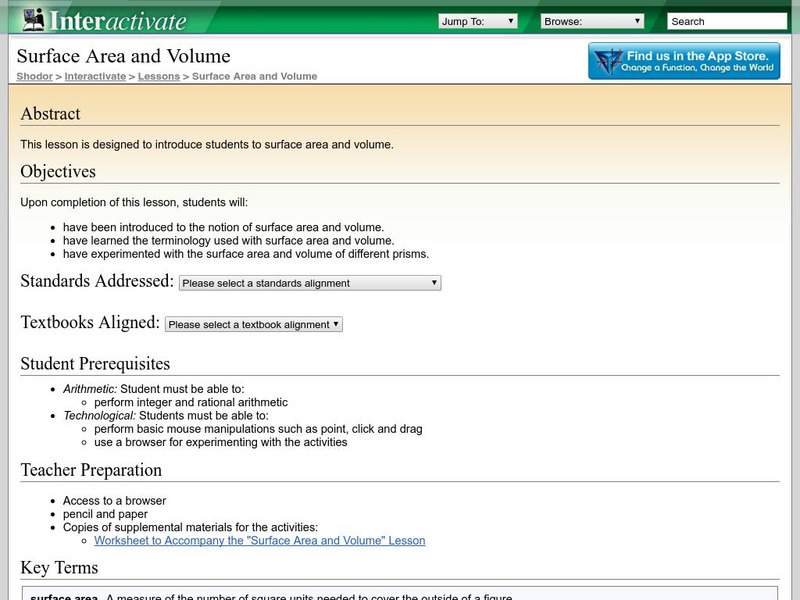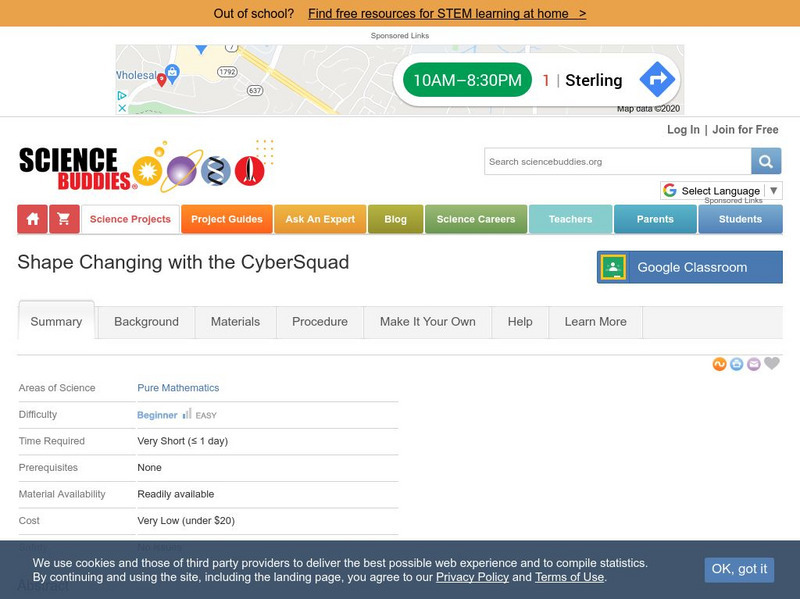Hi, what do you want to do?
Curated OER
Paper Gliders
Sixth graders study friction and drag. In this science lesson, 6th graders use different models of gliders and test to see which of the gliders fly the farthest. Students analyze their data and construct a graph.
Curated OER
Copy Cat
Students examine a Webmath page, and demonstrate how to copy and paste. They create a computer-generated template page presenting the attributes of two- and three- dimensional shapes.
Curated OER
A Novel Idea
Fifth graders read a historical novel. In groups they reenact chapters of the novel.
Curated OER
Air: It's a Gas!
Young scholars investigate the properties of air through hands-on activities in conjunction with the demonstrations in a 3-2-1 Contact Video.
Curated OER
Junk Mail Jewelry
Students create jewelry from junk mail. In this visual art lesson, students use junk mail to design necklaces and bracelets.
Curated OER
Henry Builds A Cabin
Students listen to the book "Henry Builds a Cabin." They design a cabin using Lego pieces based on information from the story.
Curated OER
Independent - To Be or Not Top Be: Press Conference
Fourth graders deliver an oral presentation on the American war for independence to small groups. They use a rubric to give each other peer feedback on the strengths and weaknesses of their presentation.
Curated OER
Kansas River: Where Do They Come From? Where Do They Flow? Which Ones Make the Kansas River Grow?
Students identify major rivers in Kansas, identify the direction which they flow and identify tributaries of the Kansas River. Students examine what occurrences upstream influence water quality downstream.
Curated OER
Float My Boat
Fourth graders, in groups, experiment with density and the displacement of water by creating and designing their own boats and seeing which boat holds the most centimeter cubes without sinking..
Better Lesson
Better Lesson: Covering and Filling: Surface Area & Volume of Rectangular Prisms
Students apply their knowledge of surface area and volume to solve some problems for a box company. This lesson contains a detailed lesson plan, video explanations, rubrics, group work guidelines, slides containing problems, and...
Shodor Education Foundation
Shodor Interactivate: Lesson: Surface Area and Volume
Middle schoolers explore surface area and volume through this lesson and worksheet activity.
Better Lesson
Better Lesson: Review of Ccss 6.g.1,2,3,4 Volume and Surface Area
Practicing math problems to prepare for a geometry assessment involving volume and surface area.
Scholastic
Scholastic: Setting the Stage With Geometry
Students will learn and reinforce skills for measuring perimeter and area of 2D shapes and measuring surface area and volume of 3D shapes.
University of Texas
Inside Mathematics: Building Blocks [Pdf]
This task challenges students to demonstrate understanding of area, surface area and volume.
Texas Instruments
Texas Instruments: Simple Programs to Apply Formulas
Students learn how to write simple programs to evaluate formulas in several variables for lists of data. They apply these skills to the computation of areas, volumes and surface areas of familiar geometric solids.
Illustrative Mathematics
Illustrative Mathematics: G Mg How Thick Is a Soda Can? Variation I
In this task, students are given the dimensions of a soda can and are asked to estimate its thickness. They must first find the surface area and the volume of aluminum. Aligns with G-MG.A.1 and G-MG.A.2.
TeachEngineering
Teach Engineering: Boxed in and Wrapped Up
Middle schoolers find the volume and surface area of a rectangular box (e.g., a cereal box), and then figure out how to convert that box into a new, cubical box having the same volume as the original. As they construct the new,...
Science Buddies
Science Buddies: Shape Changing With the Cyber Squad
In this project, you will make 2-dimensional templates, called nets, that fold up into 3-dimensional (3-D) shapes. By making shapes of different sizes, you will be able to see how 3-D shapes change with size. In your findings you will...
National Gallery of Art
National Gallery of Art: Thiebaud's Cake Math (Intermediate Version)
Using the painting, Cakes by artist Wayne Thiebaud, students will learn and practice math concepts of volume and surface area. Then they will create a bold cake painting, either online or with classroom art materials.
Better Lesson
Better Lesson: Geometry Assessment
Sixth graders solve real-world and mathematical problems involving area, volume and surface area.
Illustrative Mathematics
Illustrative Mathematics: 8.g Shipping Rolled Oats
For this task, 8th graders must determine the optimal dimensions of a cardboard box that will hold six cylinders of oats. To do this, they need to make surface area and volume calculations. Aligns with 8.G.C.9.
Alabama Learning Exchange
Alex: How Big Can a Bee Be?
Students will study the relationship between surface area and volume. Math, science, and technology components are included.
Better Lesson
Better Lesson: Prism or Pyramid?
Sixth graders explore the faces, bases, edges, and vertices of prisms and pyramids to help develop the concepts of volume and surface area.
Alabama Learning Exchange
Alex: Figure It Out
This is an Internet-based (online) and group discussion lesson. Young scholars will learn the formulas for surface area and volume of cylinders and cones. Students should have previously learned how to determine the area for a circle;...
Other popular searches
- Volume and Surface Area
- Volume Surface Area
- Surface Area Volume Cylinder
- Surface Area to Volume Ratio
- Surface Area Volume Project
- Change Surface Area Volume
- Sphere Volume Surface Area
- Area Volume Surface Area
- Geometry Surface Area Volume
- Cells Surface Area Volume
- Volume Surface Area Prism
- Cell Surface Area and Volume























